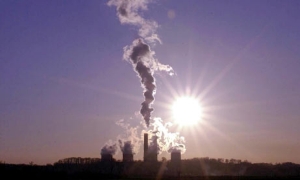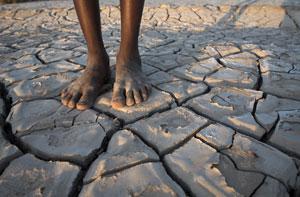 There’s an unfortunate parallel between the politics of climate change and the politics of US health care reform. They differ in scale — global vs. domestic. But consider this: Who suffers the most from the lack of universal health care in the US? The poor and unemployed. Who will suffer the most from climate change? The poor and unemployed. There are many reasons for this, but largely it’s a matter of where the poor live: the tropics, underdeveloped countries, overcrowded slums.
There’s an unfortunate parallel between the politics of climate change and the politics of US health care reform. They differ in scale — global vs. domestic. But consider this: Who suffers the most from the lack of universal health care in the US? The poor and unemployed. Who will suffer the most from climate change? The poor and unemployed. There are many reasons for this, but largely it’s a matter of where the poor live: the tropics, underdeveloped countries, overcrowded slums.
The world’s poorest populations will be the first to suffer from climate change. When they can no longer survive where they currently live, they will leave their homes and migrate. The Indian government is presently constructing a seven-foot-high fence made of double-thickness razor wire and steel. It will be 2,800 miles long (4500 km) and line the entire border between India and Bangladesh. Its purpose? To keep out terrorists, yes, but according to the BBC, it’s also meant to keep out immigrants who will flee the impact of climate change.
Does this sound like Oryx and Crake or a new science fiction flick? It’s not. This is happening in the real world.
An appeal to doctors
Although the poorest will be affected first, no one will escape the health consequences of climate change. If the governments of the world cannot agree to cut greenhouse gas emissions, we can expect a global health catastrophe.
This message was sent to doctors today in an editorial published simultaneously in The Lancet and the British Medical Journal. The medical profession is still regarded with respect. Its opinions are considered independent of the political interests surrounding climate change. Doctors don’t (yet) receive coffee mugs and weekend junkets from big polluters. The editorial calls on physicians to demand that politicians consider the implications of climate change and act now.
Food, water, insects, bacteria, weather, civil unrest, …
Here are a few of the health implications of climate change.
- Diseases spread by insects, such as dengue fever and malaria, will no longer be confined to warmer (“tropical”) areas. They will be more widespread due to increased temperatures.
- Diseases spread by bacteria, such as salmonella, could “ravage some populations.” Salmonella is the reason you don’t let mayonnaise sit out too long at a picnic.
- Heat waves will kill more people in more parts of the world. 70,000 people died in the European heat wave of 2003. By 2040 the average summer temperatures in Europe will equal those of 2003.
- Increased temperatures will mean decreasing crop yields. 800 million people already go to bed hungry every night. Food insecurity will increase, leading to mass migrations and violence.
- The most significant health problem will come from people themselves. As the climate change widens the divide between rich and poor, there will be civil unrest. This will happen first in the poorest communities.
- A shortage of water will mean an increase in stomach “flu” (gastroenteritis) and malnutrition. A primary symptom of gastroenteritis is diarrhea. There won’t be enough water to replace fluids and electrolytes. When food moves rapidly through the intestines, the body cannot absorb sufficient nutrients.
- Drought in the US and Australia has already forced people to collect and store water in tanks for longer periods. This contributes to the spread of water-borne illnesses.
- There will be more extreme climate events, such as the flash flooding that happens when rainfall patterns change and ice sheets melt. This will interfere with sewage systems, leading to diarrhea and other problems. We can also expect to lose more lives due to severe cyclones and hurricanes.
- Because the poor will migrate to cities, seeking food and water, there will be an increase in slums. This means poor sanitation systems and an increased vulnerability to extreme weather events. Imagine the regular occurrence of Hurricane Katrinas all over the world.
As I mentioned in a previous post, children will be affected by climate change before adults. Air pollution is harder on children, who breathe more rapidly, spend more time outdoors, have narrower airways, and breathe through their mouths more often than adults. Pound for pound, children drink more water, so they’re exposed to contaminated water more than adults.
The future of our species and civilization
 Preventing the health consequences of climate change requires political as well as scientific solutions. Again, there’s a parallel between health care and climate change. In the US, conservatives don’t want the government to pay for poor people they regard as the equivalent of “welfare cheats.” Even some doctors believe “there are people who really don’t deserve health care reform.”
Preventing the health consequences of climate change requires political as well as scientific solutions. Again, there’s a parallel between health care and climate change. In the US, conservatives don’t want the government to pay for poor people they regard as the equivalent of “welfare cheats.” Even some doctors believe “there are people who really don’t deserve health care reform.”
With global warming, the political antagonism is between rich and poor nations. If it’s the wealthy nations who created this problem, why should poorer countries have to contribute to the solution? In the draft of an agreement that will be discussed at the UN next Tuesday, there are already 2,000 “square brackets” singled out as areas of disagreement among the 190 participating countries.
Climate change is not just about polar bears and rain forests. It’s a health issue that will affect billions of people. And we’re not talking about something in the distant future. If we do nothing, it will happen in our lifetimes and our children’s. We’re talking about our future as a species and a civilization.
There’s general agreement that it would be much cheaper to take action now rather than wait until things get worse. But like health care in America, it can be very difficult for opposing parties to agree until there’s a crisis. Will the evidence for a global health crisis be enough to motivate agreement? We’ll find out in December. The UN is hosting a conference in Copenhagen that will attempt to create a new and comprehensive climate treaty, replacing the 1997 Kyoto protocol.
It’s good that the medical profession is speaking out on this topic. As today’s editorial points out: “Doctors are still seen as respected and independent, largely trusted by their patients and the societies in which they practise. … We call on doctors to demand that their politicians listen to the clear facts that have been identified in relation to climate change and act now to implement strategies.”
As climatologist Mark Maslin points out: “Being a climatologist and jumping up and down pulling my hair out and saying ‘we’re all going to die in a horrible way’ does not work.”
Related posts:
Scientists confront political attacks on climate change
Climate change: Bad news for children’s health
Contempt and compassion: The noncompliant patient
Climate crisis. Health crisis. Same difference.
Doctors and the health crisis of global warming
Have fun. Help the environment. Sell cars.
Sources:
(Hover over book titles for more info. Links will open in a separate window or tab.)
Victor Lim et al, Politicians must heed health effects of climate change, British Medical Journal, September 15, 2009 (subscription required)
Victor Lim et al, Politicians must heed health effects of climate change, The Lancet, September 16, 2009 (registration required)
Michael McCarthy, Climate change will damage your health, The Independent, September 16, 2009
Michael Jay and Michael Marmot, What we urgently need is a new mindset on climate change, The Guardian, September 16, 2009
Alister Doyle, Climate cuts urged to avert “health catastrophe”, Reuters, September 16, 2009
Global Warming Biggest Health Threat of 21st Century, Experts Say, Forbes, May 13, 2009
Climate ‘biggest health threat’, BBC News, May 14, 2009
Catherine Brahic, Climate change diagnosed as biggest global health threat, NewScientist, May 14, 2009
Margaret Atwood, Oryx and Crake


Sorry, comments are closed for this post.